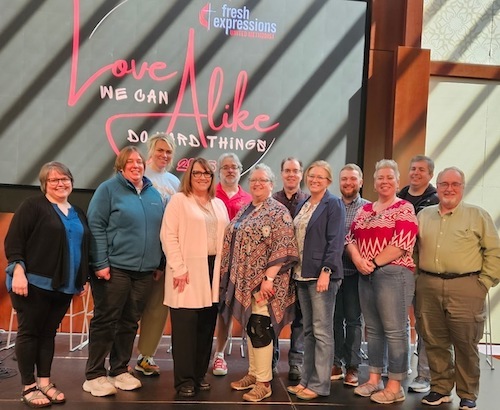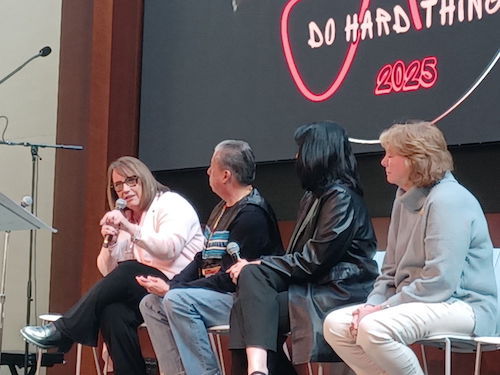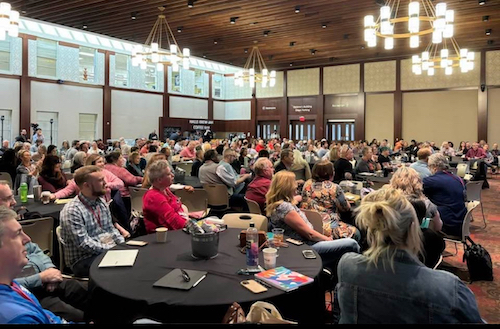
Fresh Expressions Gathering calls leaders beyond the walls

Dakotas Conference leaders attended the Fresh Expressions National Gathering in Atlanta.
Love Alike: We Can Do Hard Things. That was the theme of this year's Fresh Expressions United Methodist National Gathering. It stems from the words of John Wesley— "Though we cannot think alike, may we not love alike? May we not be of one heart, though we are not of one opinion? Without all doubt, we may. Herein all the children of God may unite, notwithstanding these smaller differences." These words may seem simple and logical. But they can feel difficult to live out in these divisive times in our world.
The theme set the tone for a gathering and a movement that is meant to call us beyond the walls of the church and beyond the traditional formats of Christian community to an incarnational expression of sharing Jesus.
The Dakotas Conference Appointive Cabinet, along with seven pastors from the Dakotas, attended the gathering held in Atlanta, Georgia in February. For the past few years, clergy and laity from across the Dakotas have been leaning into this new model of evangelism and discipleship. The gathering included several speakers as well as small group gatherings that focused on interaction, collaboration, and practical application. Bishop Lanette Plambeck was one of the presenters, taking part in two of the panel discussion presentations.
As the Dakotas attendees reflected on their takeaways from the experience, several insights and affirmations emerged.
"I think for me, the nuts and bolts really came down to what Bishop Sue [Haupert-Johnson] said about Hebrews 13—going beyond the city gates because that's where Jesus was crucified, that's where the salvation work was done—and how that translates to us in the local church getting out of our comfort zones by going beyond the church walls to the to the people in our community," shared Pastor Teresa Whetsel from Flame of Faith UMC in West Fargo, N.D. "It's going to be hard, and it can be a little painful or a little uncomfortable for us who are used to being pew sitters to do that, but it's important."
"It was a helpful reminder that this isn't a new thing—that this concept is as old as scripture itself," she added. "We are to go to the people."

Bishop Lanette joined several other United Methodist bishops for a panel discussion as part of the gathering.
Each of the attendees from the Dakotas has experimented with the Fresh Expressions model in their local settings. Attending the gathering together allowed them to share with each other what they were learning as well as new insights from the gathering.
"When we talk about Fresh Expressions [in our setting], it doesn't have to be 'Hey, busy person, start something new.' It's 'Hey, look at where you're already embedded in the community and lean into them a little bit more and be a resource for that," shared Pastor Annie Carlson, who serves Bismarck Legacy and Washburn United Methodist Churches in North Dakota. "It's not 'Start a Bible study with the parents from your traveling basketball team' but instead, 'Be open to conversation.'"
She added, "We empower our laity to look at their calendar—'What Fresh Expression is already on your calendar? Be the church right in that group because bad things happen to everybody, and when it does, you'll be the one there to offer hope and love and grace.'"
As exciting as the Fresh Expressions concept can be, it's not without its challenges as a movement trying to emerge within an existing system. "We want our pews full, and people don't see that the ministries outside the church are going to fill the pews and pay the bills, and that's a challenge," said Rev. Dan Bader, southwest district superintendent.
The paradigm of "butts and bucks" (attendance and giving measurements) is one that the Fresh Expressions movement challenges churches to overcome as they reimagine how to measure fruitfulness.
"I think it's a callback to the early church," said Carlson. "Those early house churches weren't big groups of people, and so we need to stop quantifying it in terms of how many people are at your Fresh Expression and instead ask the question, 'How many different Fresh Expressions do we have?'"
As they reflected on the gathering, the Dakotas attendees also pointed out the need for contextualization—that the framework of Fresh Expressions may need to be adapted in certain contexts, particularly the "rule" that they are gatherings outside the walls of the church building.
"We're very rural, so in a lot of these small towns, the church is the meeting place, and so don't talk yourself out of starting something because you think it has to be outside of the building," said Pastor Tia Felberg, who serves United Methodist Churches in DeSmet, Iroquois, and Carpenter, S.D. "That might be the building that the community has." She shared the example of the "Mornings with a Mission" Fresh Expression that Iroquois Trinity launched utilizing their facility. It is across the street from the school and is a logical gathering place for the community.
Contextualization and adaptability occur as we get to know our communities, which starts with taking time to listen.
"As I started listening to people and to what they need, I was hearing people saying that they'd like to get together and talk about things but not necessarily in the church building," said Pastor Teresa Person from Riverview UMC in Huron, S.D. This listening led to the launch of Sip and Scripture, a casual women's gathering for faith conversations at a local winery.
The key thing they all agreed on is that the Fresh Expressions movement is about intentionality: looking beyond ourselves, beyond who is already a part of the church, and seeing who God is calling us to go to.

Clergy and laity from across the country gathered for the Fresh Expressions United Methodist Gathering.
"I think the biggest impact [of Fresh Expressions] is reminding the church that we exist for the next person, for the person who doesn't yet know Jesus, and that Jesus was always calling us to the edges, the places of pain where his healing could happen," said Rev. Kris Mutzenberger, northeast district superintendent. She offered two quotes from the gathering that stood out to her: "Disciples are made in circles, not rows," and "Multiplication happens not when we hoard resources, but when we release them."
These leaders feel motivated to encourage their own congregations and others across the Dakotas to embrace this spirit of evangelism, discipleship, and connection.
Echoing the message of the gathering, Bader posed the question he hopes we'll wrestle with— "Are we a monument people or a movement people? Are we just here to uphold this monument of the church building, or are we about the movement of the Spirit, the movement of the faith?"
Rev. Whetsel summarized, "In a world that is growing in secularism and in which loneliness is an epidemic, I think that Fresh Expressions are a balm for the world today."
Read more news about Fresh Expressions in the Dakotas Conference.